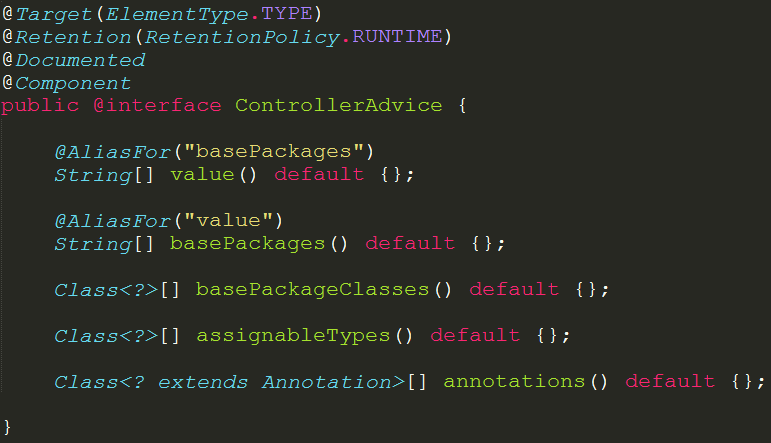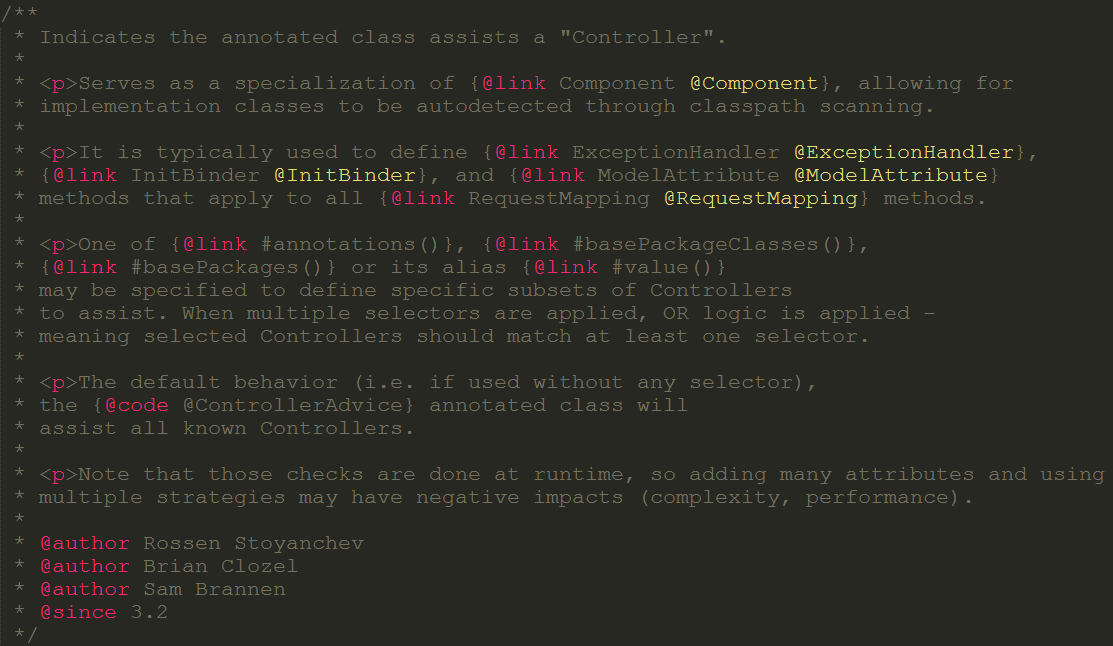统一异常处理@ExceptionHandler
转自:
https://blog.csdn.net/liujia120103/article/details/75126124/
1.当这个Controller中任何一个方法发生异常,一定会被这个方法拦截到。然后,输出日志。封装Map并返回,页面上得到status为false。
代码如下:
1 @Controller
2 public class AccessController {
3
4 /**
5 * 异常页面控制
6 *
7 * @param runtimeException
8 * @return
9 */
10 @ExceptionHandler(RuntimeException.class)
11 public @ResponseBody
12 Map<String,Object> runtimeExceptionHandler(RuntimeException runtimeException) {
13 logger.error(runtimeException.getLocalizedMessage());
14
15 Map model = new TreeMap();
16 model.put("status", false);
17 return model;
18 }
19
20 }
2.返回到错误界面
代码如下:
1 @Controller
2 public class AccessController {
3 /**
4 * 异常页面控制
5 *
6 * @param runtimeException
7 * @return
8 */
9 @ExceptionHandler(RuntimeException.class)
10 public String runtimeExceptionHandler(RuntimeException runtimeException,
11 ModelMap modelMap) {
12 logger.error(runtimeException.getLocalizedMessage());
13
14 modelMap.put("status", IntegralConstant.FAIL_STATUS);
15 return "exception";
16 }
17 }
3.使用 @ControllerAdvice,不用任何的配置,只要把这个类放在项目中,Spring能扫描到的地方。就可以实现全局异常的回调。
代码如下:
@ControllerAdvice
public class SpringExceptionHandler{
/**
* 全局处理Exception
* 错误的情况下返回500
* @param ex
* @param req
* @return
*/
@ExceptionHandler(value = {Exception.class})
public ResponseEntity<Object> handleOtherExceptions(final Exception ex, final WebRequest req) {
TResult tResult = new TResult();
tResult.setStatus(CodeType.V_500);
tResult.setErrorMessage(ex.getMessage());
return new ResponseEntity<Object>(tResult,HttpStatus.OK);
}
}
二、@ExceptionHandler注解
直接在Controller里面加上用@ExceptionHandler标注一个处理异常的方法像下面这样子
-
@ExceptionHandler(MissingServletRequestParameterException.class)
-
@ResponseStatus(HttpStatus.BAD_REQUEST)
-
public void processMethod(MissingServletRequestParameterException ex,HttpServletRequest request ,HttpServletResponse response) throws IOException {
-
System.out.println("抛异常了!"+ex.getLocalizedMessage());
-
logger.error("抛异常了!"+ex.getLocalizedMessage());
-
response.getWriter().printf(ex.getMessage());
-
response.flushBuffer();
-
}
- 1
- 2
- 3
- 4
- 5
- 6
- 7
- 8
- 1
- 2
- 3
- 4
- 5
- 6
- 7
- 8
这样,Controller里面的方法抛出了MissingServletRequestParameterException异常就会执行上面的这个方法来进行异常处理。
如下面的代码:
-
-
public String index(@MyUser User user,@RequestParam String id,ModelMap modelMap){
-
return "login";
-
}
- 1
- 2
- 3
- 4
- 1
- 2
- 3
- 4
如果我没有传入id值,那么就会抛出MissingServletRequestParameterException的异常,就会被上面的异常处理方法处理。
上面的@ExceptionHandler(MissingServletRequestParameterException.class)这个注解的value的值是一个Class[]类型的,这里的ExceptionClass是你自己指定的,你也可以指定多个需要处理的异常类型,比如这样@ExceptionHandler(value = {MissingServletRequestParameterException.class,BindException.class}),这样就会处理多个异常了。
但这个只会是在当前的Controller里面起作用,如果想在所有的Controller里面统一处理异常的话,可以用@ControllerAdvice来创建一个专门处理的类。如一中的3所述。
三、@ControllerAdvice注解
@ControllerAdvice,是Spring3.2提供的新注解,从名字上可以看出大体意思是控制器增强。让我们先看看@ControllerAdvice的实现:
没什么特别之处,该注解使用@Component注解,这样的话当我们使用<context:component-scan>扫描时也能扫描到。
再一起看看官方提供的comment。
大致意思是:
-
@ControllerAdvice是一个@Component,用于定义@ExceptionHandler,@InitBinder和@ModelAttribute方法,适用于所有使用@RequestMapping方法。
-
Spring4之前,@ControllerAdvice在同一调度的Servlet中协助所有控制器。Spring4已经改变:@ControllerAdvice支持配置控制器的子集,而默认的行为仍然可以利用。
-
在Spring4中, @ControllerAdvice通过annotations(), basePackageClasses(), basePackages() 方法定制用于选择控制器子集。
不过据经验之谈,只有配合@ExceptionHandler最有用,其它两个不常用。
在SpringMVC重要注解(一)@ExceptionHandler和@ResponseStatus我们提到,如果单使用@ExceptionHandler,只能在当前Controller中处理异常。但当配合@ControllerAdvice一起使用的时候,就可以摆脱那个限制了。
-
-
-
public class ExceptionHandlerController {
-
-
-
-
public String testExceptionHandle2(@PathVariable(value = "id") Integer id) {
-
List<String> list = Arrays.asList(new String[]{"a","b","c","d"});
-
return list.get(id-1);
-
}
-
-
}
- 1
- 2
- 3
- 4
- 5
- 6
- 7
- 8
- 9
- 10
- 11
- 12
- 1
- 2
- 3
- 4
- 5
- 6
- 7
- 8
- 9
- 10
- 11
- 12
当我们访问http://localhost:8080/SpringMVC/exception/e2/5的时候会抛出ArrayIndexOutOfBoundsException异常,这时候定义在@ControllerAdvice中的@ExceptionHandler就开始发挥作用了。
如果我们想定义一个处理全局的异常
乍一眼看上去毫无问题,但这里有一个纰漏,由于Exception是异常的父类,如果你的项目中出现过在自定义异常中使用@ResponseStatus的情况,你的初衷是碰到那个自定义异常响应对应的状态码,而这个控制器增强处理类,会首先进入,并直接返回,不会再有@ResponseStatus的事情了,这里为了解决这种纰漏,我提供了一种解决方式。
如果碰到了某个自定义异常加上了@ResponseStatus,就继续抛出,这样就不会让自定义异常失去加上@ResponseStatus的初衷。











